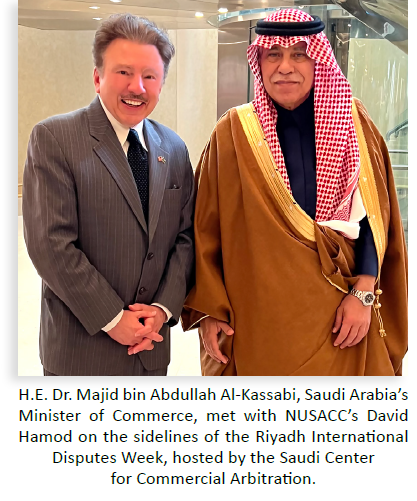NUSACC supports Alternative Dispute Resolution (ADR) gathering in Saudi Arabia

Riyadh International Disputes Week, Organized by the Saudi Center for
Commercial Arbitration, Attracts Nearly 5000 Practitioners
“Consistent with Saudi Arabia’s Vision 2030, the Kingdom is positioning itself to more effectively facilitate commerce with global traders and investors.”
– David Hamod, NUSACC’s President & CEO
Washington DC – The National U.S.-Arab Chamber of Commerce (NUSACC), America’s top commercial gateway to the Middle East and North Africa (MENA), recently helped to sponsor the inaugural Riyadh International Disputes Week (RIDW) in Saudi Arabia. Held under the auspices of the Saudi Center for Commercial Arbitration (SCCA), RIDW 2024 reflected the Kingdom’s commitment to expanding its offerings to the global community that supports commercial Alternative Dispute Resolution (ADR).
An overview of the event may be found here.
In the words of Dr. Hamed H. Merah, CEO of the SCCA and the driving force behind the Saudi Center for Commercial Arbitration, “All of us are working diligently to ensure that Saudi Arabia, the MENA region, and beyond continue to be ADR-friendly jurisdictions competing at the highest levels . . . . SCCA believes in the philosophy of continuous learning and drawing insights from many resources, while preserving SCCA’s unique identity.”
“This gathering represented an important event for our Chamber’s stakeholders because, at the end of the day, this is about the rule of law,” said David Hamod, NUSACC’s President & CEO, who attended the conference in Riyadh. “With the support of SCCA, and consistent with Saudi Arabia’s Vision 2030, the Kingdom is positioning itself to more effectively facilitate commerce with global traders and investors.”
Riyadh International Dispute Week (RIDW24)
Arbitration is an efficient method for dispute resolution for investors. SCCA is committed to create a safe environment that attracts both foreign and domestic investment to the Kingdom by eliminating obstacles to ADR between investing parties. One of the most important priorities for the SCCA is to provide a user-focused environment with transparent, timely, and flexible procedures. SCCA uses cutting-edge case management technology, in Arabic and English, and its case management services are consistent with international best practices.
In this spirit, the Riyadh International Dispute Week (RIDW) was created to establish an annual week of events that connects the global community of judges, lawyers, and arbitration and mediation practitioners. RIDW also serves to promote Riyadh as an international leader in commercial ADR and litigation.
The inaugural event was supported by 54 local and international organizations, including NUSACC. The week-long gathering, attended by nearly 5,000 practitioners, involved 92 events and 105 hosts across 79 jurisdictions.
One day was dedicated to the SCCA’s Third International Conference and Exhibition. The conference featured 30 speakers across five panels:
1) “Regional Trends and International Perspectives on Commercial ADR”
2) “ADR Accelerators and Enablers of Cross Border Trade and FDI”
3) “Trends in the Global ADR Industry”
4) “Construction Projects and Development Disputes”
5) “Sports, Entertainment, and Technologies: New Frontiers”
The week-long conference also featured the SCCA International Arbitration Moot. The Moot, now in its fifth year, enables students at faculties of law to plead complex, hypothetical arbitration cases.
This year, 134 teams from 111 universities in 27 countries participated in the Moot, which was held in Arabic. For this year’s edition, oral arguments in the group of 32 and onward were held in person at Prince Sultan University in Riyadh. The finals included King Saud University of Saudi Arabia and An-Najah National University of Palestine, which won top honors.
SCCA: Forward-Looking
James MacPherson, Chairman of the Organizing Committee for RIDW24, shared highlights of the inaugural event. In an article in Global Arbitration Review, he identified some of the forward-looking steps that SCCA has taken in recent years:
* Launching the Saudi Arabia branch of the Chartered Institute of Arbitrators (CIArb), linking the Kingdom’s ADR professionals to the more than 17,500 members of the CIArb. This approach is consistent with raising awareness of ADR among universities and knowledge partners.
* Promoting ADR services in partnership with local and international bodies. These include but are not limited to agreements with the International Center for Dispute Settlement (the international arm of the American Arbitration Association), the China International Economic and Trade Arbitration Commission (CIETAC), the Kingdom’s Economic Cities and Special Zones Authority (ECZA), and the U.N. Convention on Contracts for the International Sale of Goods (which will go into effect in September 2024).
* Refining applications of Sharia (Islamic) law. In 2023, H.E. Youssef Al Farraj – head of the Saudi Court of Appeal and chair of the committee that drafted the new Civil Transactions Law (CTL) – noted that the CTL helps to clarify elements of Sharia law that the Saudi courts will enforce in commercial contracts.
The SCCA Arbitration Rules of 2023 removed mandatory application of Sharia law, but Sharia principles “remain the foundation of Saudi law and apply to the enforcement of KSA-seated and foreign arbitral awards in the Kingdom through the gateway of public policy.”
MacPherson concluded, “The decade-long transformation of all aspects of the Saudi ADR practice, profession, and industry has been profound and comprehensive . . . With its now well-established local, regional, and international reputation as a first-rate ADR institution, the SCCA benefits from operating in an ADR-friendly jurisdiction, as reflected in its expanding international relationships and rapidly increasing caseloads.”
Updates to SCCA Rules
Internal Rules – To promote transparency, the SCCA published the Internal Rules of the SCCA Court, which came into effect on July 1, 2023. Under the Internal Rules, the Court can consolidate two or more arbitrations, adjudicate disputes over the number of arbitrators, appoint arbitrators, determine arbitrator challenges, determine the place of arbitration, review arbitral awards, assess advance deposits to fund cases, and fix the fees and expenses to be paid to the SCCA and the arbitral tribunal.
The SCCA Court acts independently of the SCCA, and Court members are appointed for three-year terms, which can be renewed only once. Implementation of these Internal Rules is intended to ensure the consistency and long-term continuity of key administrative decisions in the SCCA’s caseload.
Revised SCCA Arbitration Rules – The revised Rules were published on May 1, 2023, following extensive review. According to the SCCA Vice Chair, Toby Landau, the revised Rules “embody cutting-edge innovations with established best practices” and provide a “first-class, state-of-the-art framework for international arbitration.”
The arbitral tribunal’s discretionary powers were expanded to allow the tribunal to determine the most effective format for hearings, reject changes in party representation as a procedural safeguard, encourage parties to resort to mediation where appropriate, and limit the length of written statements or requests.
One important feature of the revised Rules is the use of technology to file documents and manage cases, particularly smaller claims. The Online Dispute Resolution Procedure Rules have been incorporated as an opt-out option in cases where the aggregate amount in dispute does not exceed 200,000 Saudi Riyals (about $53,300).
According to Norton Rose Fulbright, an international law firm that is active in Saudi Arabia, the SCCA Rules “provide for greater certainty and clarity and bring the SCCA in line with international best practice alongside other leading international arbitration institutions. They are a significant step forward to demonstrate KSA’s commitment to becoming a leading arbitration institution in the region and provide a solid framework for ensuring claims are dealt with consistently, and notably more cost effectively.”
The Norton Rose analysis may be found here.
NUSACC Support for ADR in KSA
Dr. Hamed Merah, CEO, noted that the SCCA is “committed to alignment with international best practices, and integrating them into SCCA’s innovative work.” He went on to say, “Our collective and coherent vision and commitment to this endeavor is yielding substantive and important results – which have only been possible because of the steadfast engagement and support of key partners like NUSACC. For what you have done – and will continue to do, we hope – we are sincerely grateful.”
To read the report in PDF, please click here.
Check out our Blog here!









